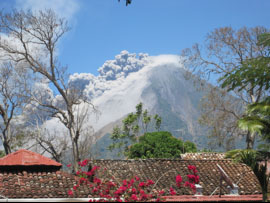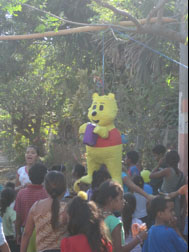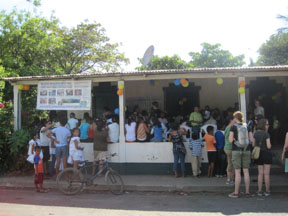By Nicole Fonsh
When I wrote a paper on my expectations of my trip to Nicaragua I concluded with ?Most of all, I do not know what to expect, and that is what I love about travel.?? And my week in Nicaragua did not disappoint!? For example, I do not think I could have ever expected to see a volcano erupt right in front of my eyes.? Or to get up in front of several librarians and show them how to make a butterfly out of a coffee filter in my broken Spanish.? Or to play soccer with children I had just met who remembered my name and cheered me onto the field.? Or to go for an impromptu swim in the Pacific Ocean.? Or to question how you create a reading culture.? Or to get into heated debates about what libraries are and mean.? Or to develop lasting friendships with fellow GSLIS students.? And probably above all, I never expected to get ?stranded? in Miami for two days at the very end of the trip.
The Start
So believe it or not, all of the above happened on my trip through Nicaragua.? Plus a whole lot more.? However, there are four events that really stood out for me and made the trip an incredibly interesting experience, one that developed my views on libraries, librarianship, and what libraries mean in other cultures.? The first event, though, had absolutely nothing to do with libraries, but rather with the amazing things that we can encounter when we travel, events that remind me how lucky I am to able to travel.
We had arrived on the island of Ometepe just hours before.? We were all taking advantage of some downtime by exploring the surroundings of the beautiful hotel and writing in journals when slowly we start to see people looking up above the hotel.? And when I turn around this is what I see:
Pretty incredible!? Not everyday that you get to see a volcano erupt before your eyes.? And that right there is what I love about traveling, the unexpected beauty that you encounter and just the unexpectedness of it all!? It sounds clich? but that is really why I travel.? You see things that you may not when you stay on your own little ?island.?? However, what this event also showed me was that as incredible as it was to be able to see this eruption, there is the chance that this volcano erupts and instead of just ash and smoke, like we saw, there could have been actual lava and actual damage and destruction to the town and people below.? That danger is something that is real and always, literally, in the background of life here on Ometepe.? That also puts things in perspective.
The reason we were in Ometepe, though, was not just to explore the island and the landscape.? We were fortunate enough to get to see one of the lending libraries have its inaugural event.? The library had been open for a short time but was not very well known in the town and was not being used a great deal.? As volunteers we came to the library in the morning to help move around displays, catalog and clean donated books, and to do some arts and crafts activities with the older children who visit the library in the morning.? I have to say that playing Twister with some of the girls was my favorite activity!? It was a good learning experience to see some ways in which they clean and preserve the books they receive as donations.?? These are the kind of tasks that seem quite simple, I think, to us, but they are the types of tasks that are essential to a library that is dependent on donations and where books are exposed to many more elements then they may be back home.
When we came back to the library after lunch, though, it was an entirely new scene!
Word must have spread fairly quickly that there was a library party happening, including dancers, Mario Montenegro, and a pi?ata.? It was pretty exciting to be there while it was all happening.? What was especially fun to see was the children who were just walking home from school, and who saw that there was something to see.? They put down their bikes and joined in the festivities.? I?m not sure that everyone there actually understood what purpose the library had, in that they could check out books from it, but it was interesting to see that they at least understood that it was some sort of place where the community could come together.? And I think that is a part of what libraries are and should be.? They are community-gathering places.? Even if you never talk to other patrons when you go to a library there is still that sense of gathering and of community that is often unspoken.? However, I think the real draw of the afternoon was the final event:
The children were so excited about this and it brought back memories of birthday parties when I was younger and how excited everyone got for the pi?ata.? So again, I?m still not sure how much a pi?ata and a library go together in terms of promoting literacy but if it gets people to the library and hopefully gets them to return in order to explore the library more, well I?m all for that.
The Bookmobile
After traveling, what felt like, all over Nicaragua, we finally came back to our starting point of San Juan del Sur on Thursday.? I was really looking forward to Friday morning because it was what I had been looking forward to ever since I signed up for the trip- the bookmobile!?? We drove out to a small rural neighborhood about 30 minutes from San Juan del Sur.? Again, we were able to experience one of the very typical modes of transportation in Nicaragua, in the back of a pick-up truck!? A little bumpy but you at least feel a little bit more like a local.
When we got to the school I think all the students were excited to see us but a little shy.? And to be honest, I felt exactly the same way.? I again became nervous that my limited Spanish and that, once again, I would have to depend on others around me to talk to the children.? However, it finally clicked for me that it sometimes takes very little to communicate with others and that often you really can do it through reading and crafts.? We read The Hungry Caterpillar, or in Spanish, La oruga muy hambrienta, to the students and I found that even though I probably mispronounced several of the words in Spanish, the children did not seem to care and even found it slightly funny.? They also seemed happy to be hearing a story.? Afterwards we made butterflies out of coffee filters and it was so neat to see how creative and even serious the children became about their butterflies, or mariposas.? And those kinds of activities take very little actual language communication.
We went outside and played some games with the students and then it was time for the big event, f?tbol (soccer)!!? Now this is when I really kind of shrunk to the side because I knew I was not the best player and I just wanted the children to be able to play.? However, it wasn?t long before I heard my name being called, by all the children from my reading group!? Earlier we had gone over everyone?s names but I was actually really surprised and touched that they had remembered mine, even after I had been completely butchering the Spanish language!? They were yelling my name because they wanted me to come and play soccer with them.? I felt oddly excited to be included in their activity and for them to actually want me to be a part of it.? Needless to say, the students beat us Americans pretty badly but it was a wonderful time and one that really was the highlight of my trip.? I love activities like that that really do not depend on knowing each other?s language.? Again, maybe clich?, but it still is the kind of event that sticks out for me.? It was also very memorable to see children looking through all the books we had brought and proudly holding up their library cards:
It really had to be one of my favorite events of the whole week.? Sports, reading, and lots of smiles.? What?s not to like?
Library in a Box
When we came back from the bookmobile we took part in an activity that really gets to the heart of what is being created in Nicaragua with the lending libraries.? The Library in a Box program began after the San Juan del Sur Biblioteca M?vil was first operating and successful.? And it is pretty much exactly what it sounds like, the supplies and necessities, in boxes, to get a lending library started.? After seeing these libraries all week it was really interesting to see how it all actually happens; how it starts.? These Library in a Box systems are like seeds to grow a library.? And on one of our final days in Nicaragua we were able to see how the boxes get put together from the beginning.? As a future librarian, I think I have a slight fixation on organization and order so to see a checklist and a system for putting this all together really excited me.? I like seeing how things come together and I like being a part of a procedure like that.? And although all I really ended up doing that afternoon was numbering books and putting them into an accession log, it was fascinating to see the seeds for a new lending library.? I think it also is a good reminder for how simple, with the funds of course; it can be to develop something like a library that will have, hopefully, a lasting impact on a community, as some of the libraries we saw do.
This, really for me, was why I wanted to take this course and come to Nicaragua.? I wanted to see the reading and library culture that was being cultivated and developed here and by seeing something like how the Library in a Box system worked, from the beginning, I was able to get a better sense of the lending library culture.? Understanding how the Library in a Box method worked put everything that I had seen throughout the week into perspective.? It felt as though we had come a bit full-circle and I could understand how with a program like this, that created roots for a library along, with communities that cared and nurtured the library, the Library in a Box could really grow and flourish in a community as an actual lending library.? I am very grateful that I had this opportunity.




